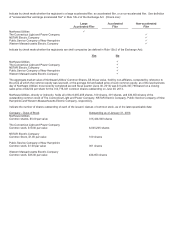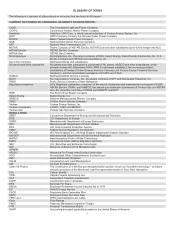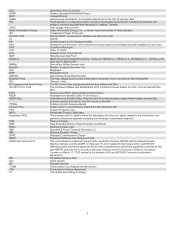Eversource 2013 Annual Report Download - page 19
Download and view the complete annual report
Please find page 19 of the 2013 Eversource annual report below. You can navigate through the pages in the report by either clicking on the pages listed below, or by using the keyword search tool below to find specific information within the annual report.7
• A distribution charge, which includes a fixed customer charge and a demand and/or energy charge to collect the costs of
building and expanding the infrastructure to deliver power to its destination, as well as ongoing operating costs.
• For WMECO, a revenue decoupling adjustment, that reconciles distribution revenue, on an annual basis, to the amount of
distribution revenue approved by the DPU in its last rate case.
• A transmission charge that recovers the cost of transporting electricity over high voltage lines from generating plants to
substations, including costs allocated by ISO-NE to maintain the wholesale electric market.
• A transition charge that represents costs to be collected primarily from previously held investments in generating plants, costs
related to existing above-market power contracts, and contract costs related to long-term power contracts buy-outs.
• Reconciling adjustment charges that recover certain DPU-approved costs, including a pension and PBOP rate to recover
incremental pension and PBOP benefit costs, a residential assistance adjustment factor to recover the cost of low income
discounts, a net-metering surcharge to collect the lost revenue and credits associated with net-metering facilities installed by
customers, a storm recovery charge to collect certain storm related costs, and an energy efficiency reconciliation factor to
recover energy efficiency program costs and lost base revenues in addition to those charges recovered in the energy
efficiency charge. In addition to these adjustments, NSTAR Electric has a reconciling adjustment charge that collects certain
safety and reliability program costs and costs related to its Smart Grid pilot program, while WMECO has a reconciling
adjustment charge that recovers costs associated with certain solar projects owned and operated by WMECO.
• A renewable energy charge that represents a legislatively-mandated charge to collect the costs to support the development
and promotion of renewable energy projects.
• An energy efficiency charge that represents a legislatively-mandated charge to collect costs for energy efficiency programs.
Rate Settlement Agreement
On February 15, 2012, NU and NSTAR reached comprehensive settlement agreements with the Massachusetts Attorney General
(Attorney General’s settlement agreement) and the DOER related to the merger. The Attorney General’s settlement agreement
covered a variety of rate-making and rate design issues, including a base distribution rate freeze through 2015 for NSTAR Electric and
WMECO. The settlement agreement reached with the DOER covered the same rate-making and rate design issues as the Attorney
General's settlement agreement, as well as a variety of matters impacting the advancement of energy policies.
Pursuant to a 2008 DPU order, Massachusetts electric utilities must adopt rate structures that decouple the volume of energy sales
from the utility’s revenues in their next rate case. WMECO is currently decoupled and NSTAR Electric will propose decoupling in its
next rate case. The exact timing of NSTAR Electric’s next rate case has not yet been determined, but it will not be before 2015.
NSTAR Electric and WMECO are each subject to service quality (SQ) metrics that measure safety, reliability and customer service and
could be required to pay to customers a SQ charge of up to 2.5 percent of annual transmission and distribution revenues for failing to
meet such metrics. Neither NSTAR Electric nor WMECO will be required to pay a SQ charge for its 2013 performance as each
company achieved results at or above target for all of its respective SQ metrics in 2013.
Sources and Availability of Electric Power Supply
As noted above, neither NSTAR Electric nor WMECO owns any generation assets (other than WMECO’s recently constructed solar
generation), and both companies purchase their respective energy requirements from a variety of competitive sources through requests
for proposals issued periodically, consistent with DPU regulations. NSTAR Electric and WMECO enter into supply contracts for basic
service for 50 percent of their respective residential and small commercial and industrial customers twice a year for twelve month terms.
Both NSTAR Electric and WMECO enter into supply contracts for basic service for 100 percent of large commercial and industrial
customers every three months.
ELECTRIC DISTRIBUTION – NEW HAMPSHIRE
PUBLIC SERVICE COMPANY OF NEW HAMPSHIRE
PSNH’s distribution business consists primarily of the generation, delivery and sale of electricity to its residential, commercial and
industrial customers. As of December 31, 2013, PSNH furnished retail franchise electric service to approximately 500,000 retail
customers in 211 cities and towns in New Hampshire, covering an area of 5,628 square miles. PSNH also owns and operates
approximately 1,200 MW of primarily fossil-fueled electricity generation plants. Included in those electric generating plants is PSNH’s
50 MW wood-burning Northern Wood Power Project at its Schiller Station in Portsmouth, New Hampshire, and approximately 70 MW of
hydroelectric generation. PSNH’s distribution business includes the activities of its generation business.
The Clean Air Project, a wet flue gas desulphurization system (Scrubber), was constructed and placed in service by PSNH at its
Merrimack Station in September 2011. PSNH completed remaining project construction activities in 2012 and the final cost of the
project was approximately $421 million.
























